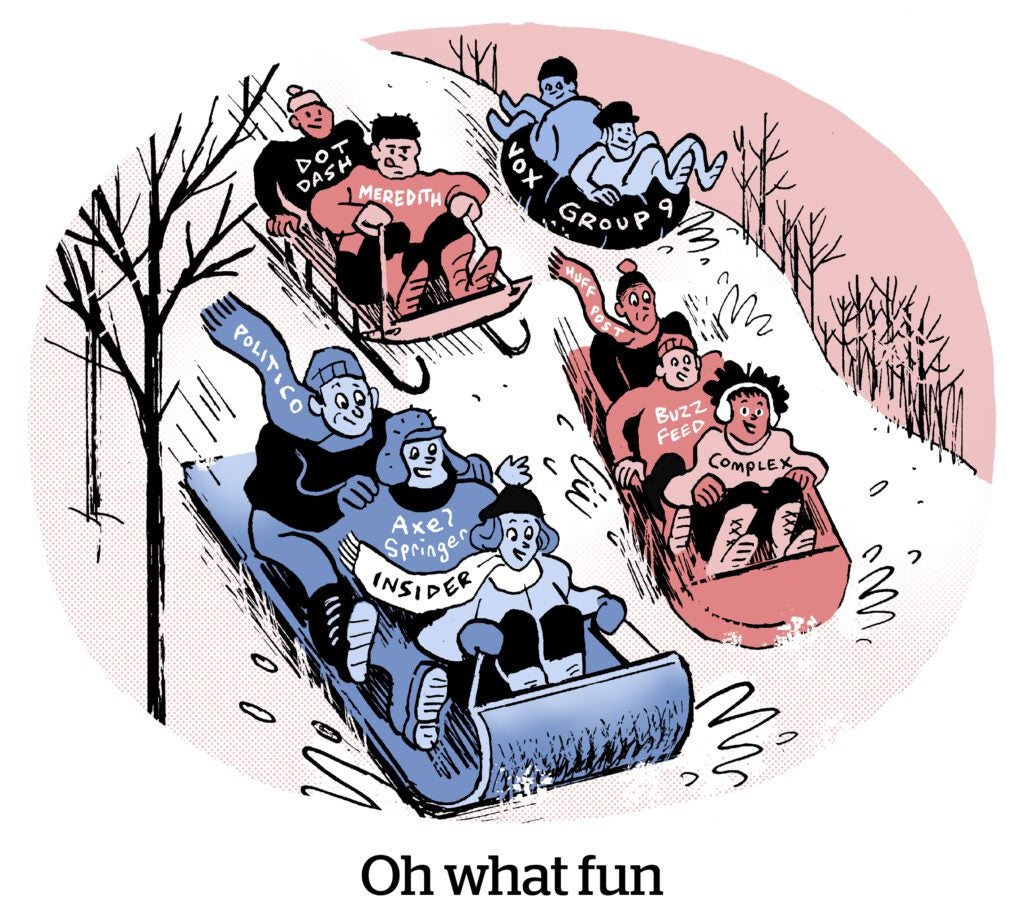Here’s today’s AdExchanger.com news round-up… Want it by email? Sign up here.
AMPed Up And AMPed Out
Last year, Google changed its search algorithm to take its thumb off the scale for AMP pages.
Accelerated Mobile Pages are a plague on web publishers. Although they promise somewhat better site-loading times, historically, all they really do is redirect people to Google-operated URLs rather than the site they intended to visit. But now that Google is emphasizing page experience in its search ranking, non-AMP pages have a chance to fight their way into Google’s Top Stories bar for mobile news searches.
Tribune Publishing made the risky move last year to stop supporting AMP pages. Google no longer requires AMP for Top Stories eligibility, but ditching AMP does hurt search traffic.
Tribune’s papers, including the Baltimore Sun, Chicago Tribune and New York Daily News, saw post-AMP search drops between 12% and 27%, depending on overall mobile traffic rates. Those were tough losses, but worth it, according to a blog post published by Kurt Gessler, the company’s former director of editorial product and strategy, who just began a gig at Taboola.
Ditching AMP means that Tribune has control over its on-site experience and isn’t saddled with tech debt related to keeping up with AMP protocols.
“And, most importantly,” Gessler writes, “we know our mobile web pages are better than AMP at converting visitors into subscribers.”
Breaking News
Speaking of the newspaper biz, but on a more sober note, Gannett, the largest American newspaper operator, announced that layoffs and reductions are coming.
Cuts over the years have gone so deep that many regional papers now employ zero or near-zero journalists, according to WaPo.
It’s part of a sick trend for the business. Although newspapers make terrible investments, they can be extremely lucrative for the private equity and hedge fund investors that suck them up (and dry) with a straw.
Gannett, while publicly traded, is owned by a newspaper vulture investor firm that rolls up to SoftBank. The second-largest US newspaper publisher is Alden Capital, a hedge fund which owns Tribune and other top papers.
The playbook involves getting rid of journalists, licensing more stories from Associated Press, Reuters and Bloomberg and filling out the paper with games, comics and other cheap, light fare. Subscriptions start to go down but at a slowish, consistent rate.
If Netflix suddenly halved its library and reduced its quality, subscribers would immediately defect. But by gutting newsrooms, newspapers become profitable for executives and investors. The bankrupt asset can also be resold to a prestige buyer. (Jeff Bezos, for example, doesn’t own The Washington Post to squeeze out a return, but for the same reason he owns a superyacht).
Bad Apple
The US Department of Justice has begun the process of drafting an antitrust suit against Apple, according to Politico.
The DOJ has been investigating Apple’s business practices since 2019 in light of accusations that Apple stifles competition, harming smaller hardware and software companies.
The government is also preparing to sue one of Apple’s main competitors, Google parent company Alphabet, over antitrust concerns tied to its advertising business as soon as September. (The DOJ is already suing Alphabet over allegedly anticompetitive practices in the search market.)
Apple’s business practices were put under the spotlight thanks to an antitrust case filed against Apple by Fortnite developer Epic Games. Epic claimed that Apple’s 30% revenue cut for in-app purchases on iOS apps was anticompetitive. That case was decided in Apple’s favor, but Epic Games is appealing the decision – a process that could take years – and Apple is being forced to allow developers to direct users to websites as a way around Apple’s payment controls.
Although no decision on whether to sue Apple has been made yet, sources say the DOJ’s antitrust division reportedly hopes to file its suit this year.
But Wait, There’s More!
Building your own brand-based customer platform. [HBR]
Twitter is letting some news publishers post customizable cards to expand the surface areas of tweets. [Nieman Lab]
Sony Interactive Entertainment will acquire mobile gaming developer Savage Game Studios. [release]
Flicking the kill switch: Governments embrace internet shutdowns as a form of control. [The Guardian]
Netflix eyes a $7-to-$9 monthly price tag for its new ad-supported plan. [Bloomberg]
How Dateline NBC looks to grow its podcast business with Apple. [Digiday]
You’re Hired!
Dentsu adds Jill Metcalf as chief of business strategy and transformation for Dentsu Media in the Americas. [Adweek]













